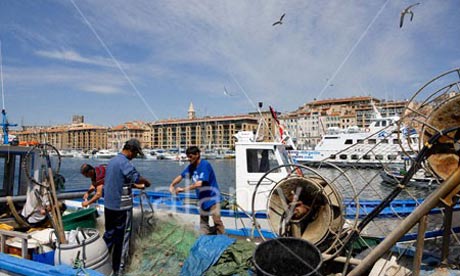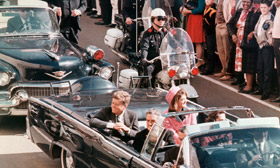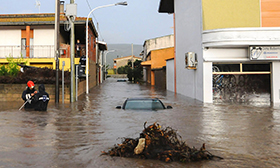In the old port of Massalia, where the Greeks arrived 2,600 years ago, the yachts, fishing boats and pleasure craft bob in the dappled water, as nut-brown fishermen sell the morning catch.
A few streets away, the chic restaurants are packed and the luxury goods shops are doing brisk business in monogrammed handbags and gold watches. In the neighbouring quartier, prostitutes and drug dealers duck and dive to avoid the police patrols. These are the two faces of modern Marseille: the cosmopolitan, cultured pearl of the Mediterranean on the one hand; Rio-sur-Mer, as certain papers have nicknamed it, a lawless badland full of gangsters who could hold their own in the most dangerous Brazilian favela, on the other.
With the city preparing for its year in the international limelight as European culture capital in 2013, there is a battle for Marseille's soul that will determine its reputation and future. No one in Marseille denies it has a huge problem with crime. Drugs, gambling and prostitution – and, more recently, corruption – have dominated the city's mob scene for four decades. But like many here, Yves Moraine, a lawyer and president of the ruling centre-right UMP group on the council, is sick of hearing the city likened to crime-riddled Rio, the Camorra stronghold of Naples, or even Chicago, America's murder capital.
"It is a caricature, and unfair stigmatisation," he says, his voice rising. "If I said everything was rosy in Marseille I would be lying. But insisting everything is black, that is a lie too. Yes, there is poverty and delinquency and corruption, but to say things are black, black, black is utterly false." Moraine believes the culture year is a chance for Marseille to put its troubled past behind it and drag itself into the 21st century. Foreigners and native French always muddled along in a city that was home to writers, poets and artists, including Auguste Renoir, Paul Cézanne and Raoul Dufy and, more recently, footballer Zinedine Zidane.
The dark underside of this melting pot has always been, as it is now, a higher than average level of violence and crime, often rooted in widespread poverty and the seediness depicted in the 1970s Gene Hackman film The French Connection II. However, the bubbling undercurrent turned into a terrifying tsunami at the beginning of the year with what one police officer described as an outbreak of "ultra violence" leading to 20 drug-related assassinations in nine months.
David Oliver Reverdy, of the Marseille branch of the Alliance police union, blames it on territorial disputes between drug barons and a proliferation of weapons, namely Kalashnikovs, the weapon of choice for the city's criminal class. He says the killers and their victims were mostly young dealers, often minors, who "were afraid of nothing" and showed "an astonishing lack of consideration for human life or scruples about their atrocious acts".
The violence of the attacks created an atmosphere of fear in a city that, unlike Paris, has not shunted its immigrant underclass out into grim high-rise suburbs, but still boasts run-down estates where youth unemployment is reported to be as high as 40%, more than 20% live under the poverty line, and jobless youngsters have turned to drugs and crime. "Disputes that would once have been settled with a punch are now being resolved with a Kalashnikov," said Reverdy. Since September, when a new police chief arrived – the third in three years – Reverdy says the situation has calmed. The killings have almost stopped and street crime has fallen to a third of its previous rate – thanks, he says, to more police officers patrolling the city.
Just down from Marseille's magnificent St Charles station, built in 1848, Sami, as he calls himself, is with a group of youngsters kicking their heels in the shadow of decrepit stone buildings hung with drying washing. He says that his parents are Moroccan and he was born in France. He claims to be 15 but looks younger. Shouldn't he be at school? He shrugs. "Why?" he says before loping off.
Said, a youth worker, says young Marseillais find it more lucrative to peddle drugs than go to classes. "A lot of the youngsters we're working with live in poverty and haven't been to school for years. We try to help them, but it's hard to motivate them to work hard at their education when they can earn more money dealing and there's no jobs for them afterwards."
The city authorities are investing €800m for the capital of culture year, building new museums and extensions to existing museums and galleries, plus an extra €90m on imaginative events.
Jean-François Chougnet, director of the 2013 culture year organisers, said he hoped it would help Marseille to metamorphose. But Benoît Gilles, a reporter with La Marseillaise, a daily newspaper founded in 1943 by members of the communist resistance, said 2013 risked further excluding the already excluded. "Organising a free street event or a spectacle in a rundown area is not going to make people feel included. The situation in Marseille is complicated. It cannot be denied that delinquency and crime are high here, but building museums and organising cultural events is not going to be a magic wand that is waved and suddenly everything is fine."
Back in the Old Port, Fanny Rose Arnay, 72, was enjoying the warm November day. A familiar figure around the local fish market, she can often be found in sequins and a feather boa, singing to passers-by and tourists.
She summed up the paradox that is Marseille. "It's a strange place," she said. "On the one hand it's undisciplined and very dangerous, so dangerous that sometimes I am afraid to go out. On the other, it's colourful, interesting and extraordinary. Marseille...it's like nowhere else in the world."
• The following correction was published in the Observer on 4 December 2011:
"A battle for the ancient port's divided soul" (Dispatch, Marseille) described Chicago as "the murder capital of America". According to FBI statistics from 2010, New Orleans tops the infamous league with a rate of 49.9 per 100,000. St Louis is second at 40.5. Chicago is down the list at 15.2.



















